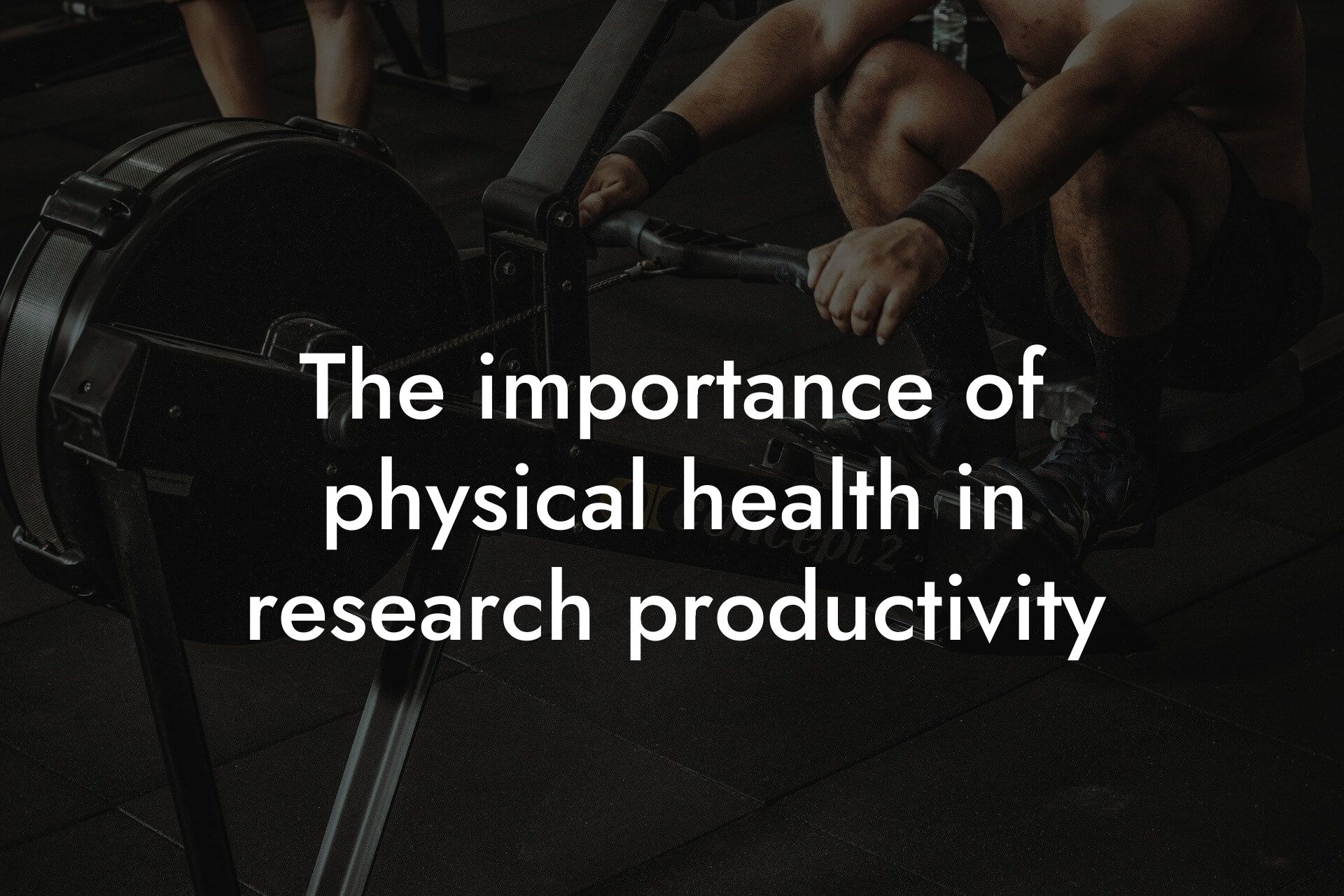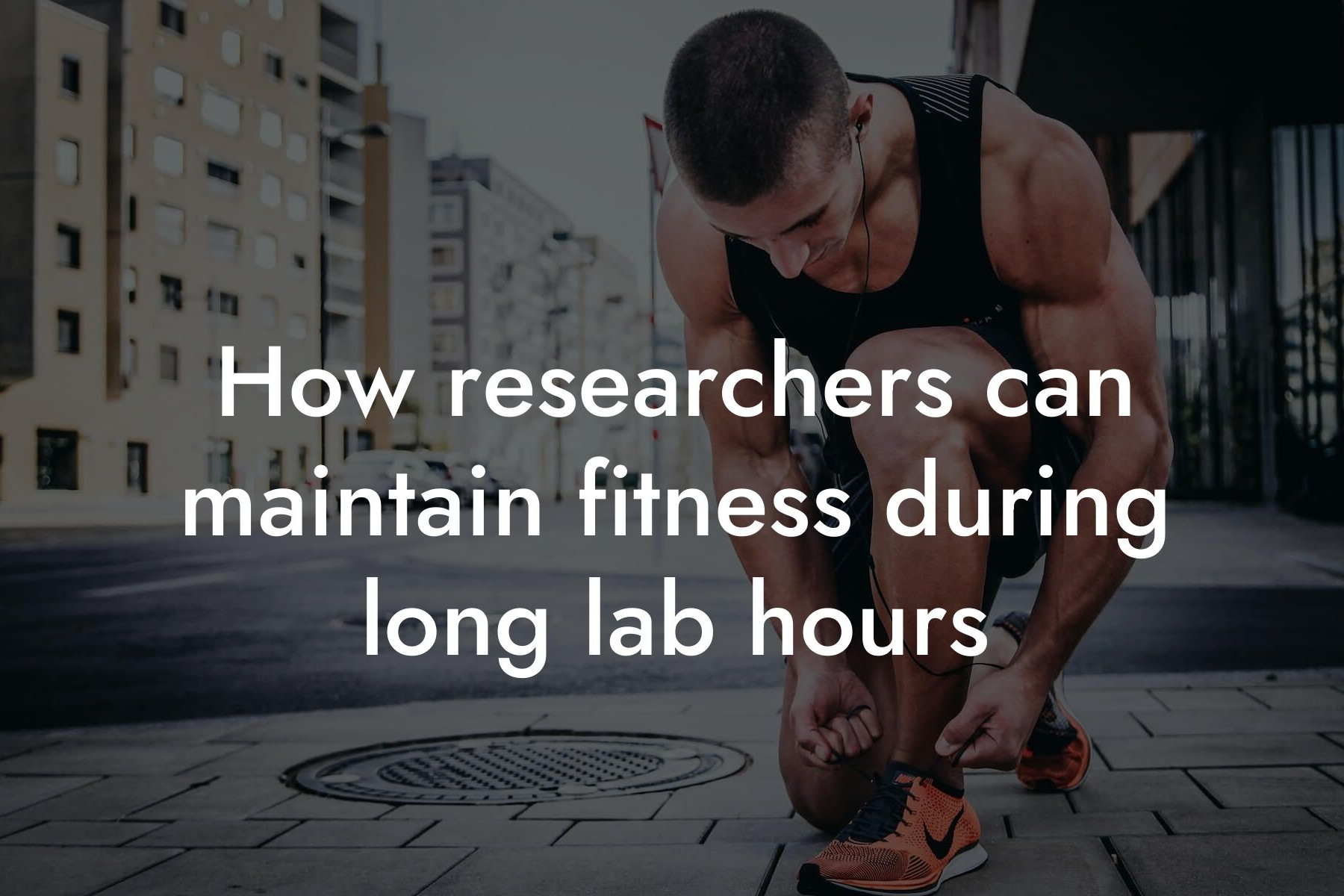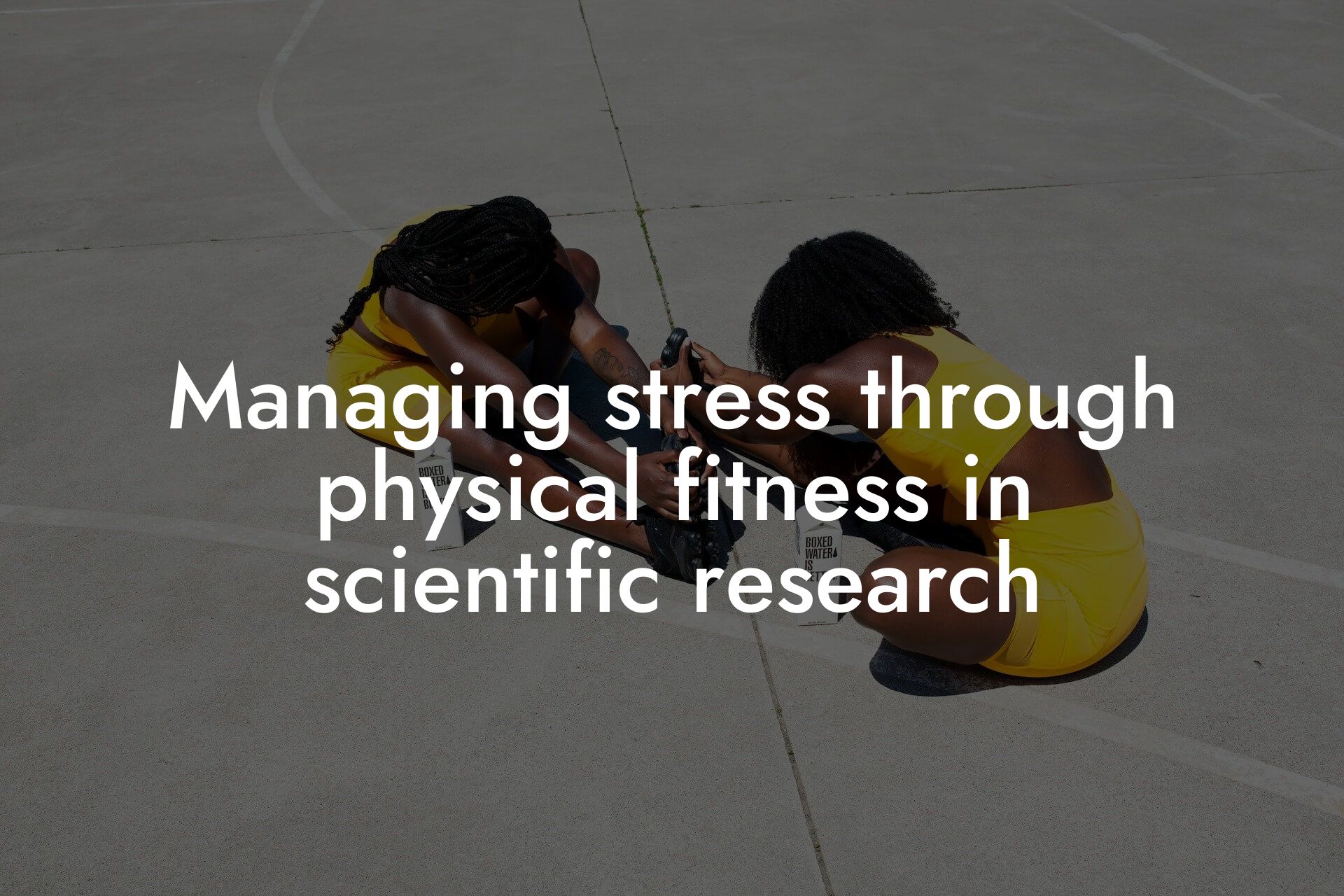As a high-earning professional, you understand the importance of maintaining a healthy work-life balance. However, when you're working in a laboratory setting, it can be challenging to prioritize your personal fitness goals. Long hours, demanding tasks, and high levels of stress can make it difficult to find time for exercise and self-care. But neglecting your physical health can have serious consequences, including decreased productivity, increased risk of chronic diseases, and a lower quality of life. In this article, we'll explore the importance of balancing lab work with personal fitness goals and provide practical tips and strategies for achieving this balance.
Table of Contents
- Why Fitness Matters for Laboratory Professionals
- The Challenges of Balancing Lab Work and Fitness
- Creating a Fitness Schedule That Works for You
- Incorporating Exercise into Your Daily Routine
- Lab-Friendly Exercises for Busy Professionals
- Nutrition and Hydration for Optimal Performance
- Tracking Progress and Staying Motivated
- DEXA Scans: A Valuable Tool for Tracking Progress
- Frequently Asked Questions
Why Fitness Matters for Laboratory Professionals
As a laboratory professional, you're likely no stranger to the physical and mental demands of your job. You may spend long hours on your feet, lift heavy equipment, and work in a fast-paced environment that can be stressful and overwhelming. Regular exercise can help mitigate the negative effects of this lifestyle by improving your overall health and well-being. Fitness can also enhance your cognitive function, boost your mood, and increase your energy levels, making you more productive and focused in the lab.
The Challenges of Balancing Lab Work and Fitness
Despite the importance of fitness, many laboratory professionals struggle to prioritize their physical health. Long hours, shift work, and high levels of stress can make it difficult to find time for exercise and self-care. Additionally, the physical demands of lab work can leave you feeling exhausted, making it challenging to muster the energy to engage in physical activity outside of work. Furthermore, the sedentary nature of many laboratory tasks can contribute to a lack of physical activity, making it even harder to establish a regular exercise routine.
Creating a Fitness Schedule That Works for You
To balance lab work with personal fitness goals, it's essential to create a schedule that works for you. Start by identifying your most productive times of day and scheduling your workouts accordingly. If you're a morning person, consider waking up early to fit in a workout before your shift. If you're more energized in the evening, schedule your workout after dinner. Be realistic about your availability and commit to a schedule that you can maintain in the long term.
Incorporating Exercise into Your Daily Routine
While it's ideal to have a dedicated block of time for exercise, it's not always possible. However, there are ways to incorporate physical activity into your daily routine, even on the busiest of days. Try taking the stairs instead of the elevator, doing a few jumping jacks during commercial breaks, or taking a short walk during your lunch break. These small bursts of activity can add up and make a significant difference in your overall fitness.
Lab-Friendly Exercises for Busy Professionals
As a laboratory professional, you may not have access to a gym or a lot of free time. However, there are exercises that can be done in a small space with minimal equipment. Bodyweight exercises like push-ups, squats, and lunges are effective and convenient. You can also try resistance band exercises, which are lightweight and portable. If you have a desk job, consider doing chair squats, desk push-ups, or leg raises to keep your muscles engaged.
Nutrition and Hydration for Optimal Performance
Exercise is only half the battle when it comes to achieving your fitness goals. A balanced diet and proper hydration are essential for optimal performance. As a laboratory professional, you may have limited time for meal prep, but there are ways to make healthy choices on the go. Pack snacks like nuts, fruits, and energy bars, and consider meal delivery services or meal prep containers. Stay hydrated by drinking plenty of water throughout the day, and avoid sugary drinks that can lead to energy crashes.
Tracking Progress and Staying Motivated
Tracking your progress and staying motivated are crucial for achieving your fitness goals. Consider investing in a fitness tracker or wearable device that can monitor your activity levels, sleep patterns, and nutrition. You can also use mobile apps like MyFitnessPal or Strava to track your workouts and connect with like-minded individuals. Celebrate your successes, no matter how small, and don't be too hard on yourself when you encounter setbacks.
DEXA Scans: A Valuable Tool for Tracking Progress
At Tano Performance Group, we understand the importance of tracking progress and staying motivated. That's why we offer DEXA scans, a valuable tool for measuring body composition, bone density, and other health metrics. Our DEXA scans provide a comprehensive picture of your overall health, helping you identify areas for improvement and track your progress over time. With this information, you can make informed decisions about your fitness routine and nutrition plan, ensuring that you're on track to achieve your goals.
Balancing lab work with personal fitness goals requires commitment, creativity, and a willingness to prioritize your physical health. By creating a schedule that works for you, incorporating exercise into your daily routine, and making healthy choices, you can achieve your fitness goals and improve your overall well-being. Remember to track your progress, stay motivated, and take advantage of valuable tools like DEXA scans to help you reach your goals. With persistence and dedication, you can achieve a better work-life balance and become the best version of yourself.
Frequently Asked Questions
How can I prioritize my fitness goals when I have a demanding lab schedule?
As a high-earning professional, it's essential to strike a balance between your lab work and personal fitness goals. Start by identifying your non-negotiables – what are your must-achieve fitness goals? Then, schedule your workouts around your lab commitments, ensuring you're allocating sufficient time for both. Consider waking up earlier for a morning workout or utilizing your lunch break for a quick exercise session. Remember, every bit counts, and even small increments of physical activity can make a significant difference.
What are some effective time-management strategies for balancing lab work and fitness?
To optimize your time, prioritize your tasks, and focus on the most critical lab work during peak productivity hours. Use a planner, app, or tool to schedule your workouts and lab tasks, ensuring a realistic allocation of time. Set reminders, and make sure to leave some buffer time for unexpected lab tasks or personal emergencies. By doing so, you'll be able to manage your time efficiently and make progress towards your fitness goals.
How can I stay motivated to exercise when I'm exhausted from lab work?
It's common to feel drained after a long day in the lab, but it's essential to push through the initial fatigue. Remind yourself why you started your fitness journey in the first place, and celebrate small victories along the way. Find an exercise buddy or join a fitness community to provide moral support and accountability. Additionally, focus on the energy-boosting benefits of exercise, such as increased endorphins and improved sleep quality, to help you power through those tough days.
What are some exercises that can be done in a short amount of time?
When time is limited, focus on high-intensity interval training (HIIT) or quick, effective exercises that target multiple muscle groups. Examples include burpees, jump squats, mountain climbers, plank jacks, and resistance band exercises. These exercises can be done in as little as 10-20 minutes, making them perfect for busy professionals with limited time.
How can I ensure I'm getting enough rest and recovery time?
Adequate rest and recovery are crucial for both lab work and fitness goals. Prioritize sleep by establishing a consistent bedtime routine, avoiding screens before bed, and creating a sleep-conducive environment. Allocate time for stretching, foam rolling, or self-myofascial release to aid in muscle recovery. Additionally, incorporate rest days into your workout schedule to allow your body to repair and rebuild.
What are some healthy snack options to fuel my lab work and workouts?
As a busy professional, it's essential to fuel your body with nutrient-dense snacks that support both your lab work and fitness goals. Opt for snacks high in protein and complex carbohydrates, such as nuts, seeds, fruits, and energy bars. Avoid sugary drinks and processed snacks that can lead to energy crashes and decreased productivity. Stay hydrated by drinking plenty of water throughout the day.
Can I still achieve my fitness goals if I have a desk job in the lab?
Absolutely! Having a desk job in the lab doesn't mean you can't achieve your fitness goals. Take advantage of opportunities to move throughout the day, such as taking the stairs, doing desk exercises, or going for a short walk during breaks. Incorporate strength training exercises that can be done at your desk, like chair squats or desk push-ups. Every bit of movement counts, and making small changes to your daily routine can add up to significant progress over time.
How can I track my progress and stay accountable?
Tracking your progress is crucial to staying motivated and achieving your fitness goals. Use a fitness tracker, log your workouts, or take progress photos to monitor your progress. Share your goals with a friend or accountability partner to provide an added motivation to stay on track. Celebrate your successes and learn from your setbacks to continue moving forward.
What are some common mistakes to avoid when balancing lab work and fitness?
Common mistakes to avoid include overcommitting to workouts, neglecting rest and recovery, and prioritizing one aspect of your life over the other. Avoid comparing yourself to others and focus on your individual progress. Don't be too hard on yourself if you miss a workout or have a setback – instead, learn from the experience and move forward.
How can I make healthy meal prep a part of my busy schedule?
Healthy meal prep is essential for supporting both your lab work and fitness goals. Allocate one day a week to meal prep, and focus on preparing protein-rich meals that can be reheated throughout the week. Invest in a slow cooker or instant pot to make meal prep easier and more efficient. Consider meal delivery services or prep containers to save time and reduce stress.
What are some stress-reducing techniques to help me cope with lab work and fitness demands?
Stress reduction is crucial for overall well-being. Practice deep breathing exercises, meditation, or yoga to help manage stress. Take regular breaks throughout the day to stretch, move your body, or practice mindfulness. Prioritize self-care activities, such as reading or listening to music, to help reduce stress and increase productivity.
How can I stay organized and manage my time effectively?
Effective time management is key to balancing lab work and fitness goals. Use a planner, app, or tool to schedule your tasks and workouts. Prioritize your most critical lab work and focus on the most important tasks during peak productivity hours. Learn to say no to non-essential tasks and delegate when possible to free up time for more important activities.
What are some ways to stay motivated during periods of slow progress?
It's normal to experience periods of slow progress, but it's essential to stay motivated. Celebrate small victories, focus on the process rather than the outcome, and remind yourself why you started your fitness journey in the first place. Find a workout buddy or join a fitness community to provide moral support and accountability. Reward yourself for small milestones achieved, and don't be too hard on yourself during periods of slow progress.
How can I ensure I'm getting enough protein to support my fitness goals?
Adequate protein intake is crucial for muscle growth and repair. Aim to consume 1-1.5 grams of protein per kilogram of body weight from sources like lean meats, fish, eggs, dairy, and plant-based options. Consider protein supplements or meal replacement shakes to support your fitness goals, especially during periods of high intensity training.
What are some common injuries to watch out for when starting a new exercise routine?
Common injuries to watch out for when starting a new exercise routine include muscle strains, tendonitis, and joint pain. Listen to your body and take regular breaks to avoid overexertion. Focus on proper form and technique, and incorporate exercises that strengthen your core and improve flexibility. Consult with a fitness professional or healthcare expert if you experience any pain or discomfort.
How can I make time for stretching and foam rolling?
Stretching and foam rolling are essential for muscle recovery and injury prevention. Allocate 10-15 minutes per day for stretching and foam rolling, focusing on areas like your hamstrings, quadriceps, and lower back. Incorporate dynamic stretching into your warm-up routine, and prioritize static stretching after your workouts. Use a foam roller or lacrosse ball to aid in self-myofascial release and reduce muscle tension.
What are some tips for staying hydrated during lab work and workouts?
Staying hydrated is crucial for both lab work and fitness goals. Drink at least 8-10 glasses of water per day, and avoid sugary drinks that can lead to dehydration. Monitor your urine output and color to ensure you're staying hydrated, and consider incorporating electrolyte-rich drinks or supplements during intense workouts.
How can I prioritize my mental health when balancing lab work and fitness?
Mental health is essential for overall well-being. Prioritize self-care activities, such as meditation, yoga, or reading, to reduce stress and increase productivity. Take regular breaks throughout the day to stretch, move your body, or practice mindfulness. Avoid overcommitting to workouts or lab tasks, and focus on activities that bring you joy and fulfillment.
What are some effective ways to track my progress and stay accountable?
Effective ways to track progress and stay accountable include using a fitness tracker, logging your workouts, or taking progress photos. Share your goals with a friend or accountability partner, and consider working with a personal trainer or fitness coach. Celebrate your successes and learn from your setbacks to continue moving forward.
How can I make fitness a sustainable part of my lifestyle?
To make fitness a sustainable part of your lifestyle, focus on making gradual changes that you can maintain in the long term. Avoid fad diets or extreme workout routines that are difficult to sustain. Find exercises and activities that you enjoy, and prioritize consistency over perfection. Celebrate small victories along the way, and remind yourself why you started your fitness journey in the first place.
What are some common myths about balancing lab work and fitness?
Common myths about balancing lab work and fitness include the idea that you need to choose between the two, or that you can't achieve your fitness goals with a demanding lab schedule. Debunk these myths by prioritizing your time, focusing on consistency, and celebrating small victories along the way. Remember, every bit counts, and making small changes to your daily routine can add up to significant progress over time.
Here are some related articles you might love...
- The importance of physical health in research productivity
- How researchers can maintain fitness during long lab hours
- Managing stress through physical fitness in scientific research
- The impact of body composition on cognitive function in research
- Quick workouts for researchers during lab breaks
- Nutrition strategies for maintaining focus during experiments
- The role of physical fitness in preventing research-related injuries
- How to stay active during sedentary research work
- How DEXA scans can benefit scientists and researchers
Zak Faulkner
Zak Faulkner is a leading authority in the realm of physical health and body composition analysis, with over 15 years of experience helping professionals optimise their fitness and well-being. As one the experts behind Tano Performance Group, Zak has dedicated his career to providing in-depth, science-backed insights that empower clients to elevate their physical performance and overall health.
With extensive knowledge of DEXA technology, Zak specializes in delivering comprehensive body assessments that offer precise data on body fat, muscle mass, bone density, and overall physique. His expertise enables individuals to make informed decisions and achieve their fitness goals with accuracy and confidence. Zak’s approach is rooted in a deep understanding of human physiology, combined with a passion for helping clients unlock their full potential through personalised strategies.
Over the years, Zak has earned a reputation for his commitment to excellence, precision, and client-focused service. His guidance is trusted by top professionals who demand the best when it comes to their health. Whether advising on fitness programs, nutritional strategies, or long-term wellness plans, Zak Faulkner’s insights are a valuable resource for anyone serious about taking their health and fitness to the next level.
At Tano Performance Group, Zak continues to lead our Content Team revolutionising how professionals approach their physical health, offering unparalleled expertise that drives real results.




